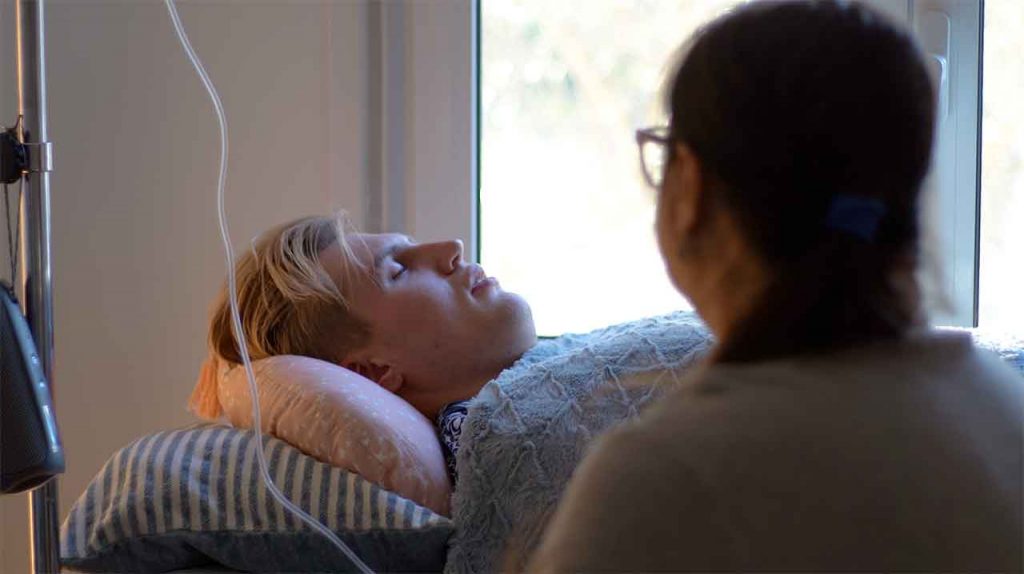The interaction of body and mind: a look at psychosomatic medicine
Psychosomatic medicine assumes that psychological and physical factors can influence each other. Mental stress, such as stress, anxiety or depression, can trigger or exacerbate physical complaints. Conversely, physical illnesses can also lead to psychological problems. The connection between body and mind is a fascinating and complex phenomenon that is expressed in psychosomatics.
What is psychosomatic medicine?
Psychosomatic medicine is an interdisciplinary field that deals with the connection between mental and physical illnesses. The term psychosomatics is composed of the ancient Greek words “psyché” (soul) and “soma” (body), which emphasizes the close connection between these two areas. Psychosomatics is concerned with understanding and researching the interaction between mental and physical processes in the human organism.
Examples of psychosomatic illnesses :
Practically all physical symptoms can be triggered by emotional factors. Here are a few examples:
- Depression, which also manifests itself through pain
- Anxiety disorders that manifest themselves in physical symptoms such as a racing heart or dizziness
- Obsessive-compulsive disorders
- Gastrointestinal diseases such as ulcerative colitis or duodenal ulcers
- Headaches, such as tension headaches or migraines
- Skin diseases such as neurodermatitis or urticaria
- Sleep disorders
- Cardiovascular diseases, such as certain forms of high blood pressure and coronary heart disease
- Viral and bacterial inflammations caused by stress and associated immune system disorders
In all these diseases there is clear morphological damage, but emotions play a decisive role in the onset and chronification.
The basics of psychosomatics?
Definition, causes and development of psychosomatic complaints:
Psychosomatics, also known as psychosomatic medicine, has its origins in the understanding that psychological factors play a significant role in the development, course and treatment of physical illnesses. Causes of psychosomatic illnesses The causes of psychosomatic illnesses are complex. Various factors such as genetics, personality factors, nutrition and environmental influences play a role.
Development of psychosomatic illnesses
Psychosomatic illnesses arise from the complex interaction between psychological and physical factors. These illnesses are characterized by the fact that psychological stress and conflicts manifest themselves on a physical level and lead to real, often severe physical symptoms. Here are some key factors that can contribute to the development of psychosomatic illnesses:

- Stress and emotional strain:
Chronic stress and emotional strain play a central role in the development of psychosomatic illnesses. Stress can affect the immune system, promote inflammation and disrupt the regulation of various bodily functions, which can lead to physical complaints. The causes of immune system disorders are often epigenetic, i.e. they arise intrauterine or in the first few months of life. - Unresolved psychological conflicts:
Unresolved psychological conflicts, especially if they persist over a longer period of time, can have an impact on the body. The suppression of emotions or the lack of appropriate coping strategies can lead to the somatic manifestation of psychological stress. - Genetic predisposition:
There is evidence that genetic factors may play a role in susceptibility to psychosomatic illnesses. Some people may be more sensitive to stress and emotional strain due to their genetic predisposition. - Cognitive processing:
The way a person processes and interprets information also plays a role. Cognitive distortions, such as negative thinking patterns and excessive rumination, can contribute to psychosomatic complaints by increasing and maintaining stress. - Traumatic experiences:
Experiences of trauma, whether in childhood or adulthood, can promote psychosomatic illnesses. Post-traumatic stress disorder (PTSD) is an example of how traumatic events can manifest themselves both psychologically and physically. - Personality factors:
A person’s personality structure can influence the development of psychosomatic illnesses. Perfectionism, excessive worry and high demands on oneself can increase stress and trigger physical symptoms. - Social influences:
Social factors, such as difficult relationships, occupational stress or financial problems, can influence psychosomatic illnesses. The lack of social support can further increase the burden. - Changes in the hormone balance:
Chronic psychological stress can lead to hormonal dysregulation. The release of stress hormones such as cortisol can affect various physiological systems and promote the development of physical complaints.
It is important to emphasize that psychosomatic illnesses do not have purely psychological or purely physical causes. Rather, they are complex interactions between mental and physical processes. The treatment of psychosomatic illnesses therefore requires a holistic approach that takes into account both the psychological and physical aspects. Psychotherapy, stress management, relaxation techniques and body-oriented therapeutic approaches can be important elements in the management of psychosomatic illnesses.
In our clinic in Mallorca, we successfully treat various psychosomatic illnesses such as depression and other neurological and mental illnesses with rTMS, ketamine infusions, intensive psychotherapy, and ketamine-assisted psychotherapy, neurostimulation procedures such as neurofeedback. With our combined psychosomatic treatment, we achieve rapid and long-term improvement in the symptoms of many psychosomatic illnesses. The treatments are carried out by specialist staff and under the supervision of medical specialists. The treatment is safe and painless and always individually tailored to the patient.
Psychosomatics in practice:
Psychosomatic diseases:
Psychosomatic illnesses manifest themselves physically, although their causes lie on a psychological level. Examples include irritable bowel syndrome, tension headaches and certain forms of skin disorders. The symptoms can be influenced and intensified by psychological factors.
Somatoform disorders:
Somatoform disorders are mental illnesses in which physical complaints occur for which no sufficient organic causes can be found. The symptoms are often an expression of unconscious conflicts or psychological stress.
The placebo effect and psychosomatic healing:
Psychosomatics also sheds light on the placebo effect, where positive changes occur without specific medical treatment. This highlights the role of expectation and mental processes in the recovery of physical ailments.
Therapeutic approaches in psychosomatic medicine:
General psychosomatic treatment methods include the following therapy methods
Psychotherapy:
Psychotherapy plays a central role in psychosomatic treatment. Through talk therapy, cognitive behavioral therapy or depth psychology approaches, psychological stress can be identified and dealt with, which can have positive effects on physical health. Psychotherapy can help to reduce psychological stress, develop coping strategies and build healthy self-esteem.
Relaxation methods:
Entspannungsverfahren wie progressive Muskelentspannung, autogenes Training oder Yoga können dabei helfen, Stress abzubauen und die Wechselwirkung zwischen psychischer Anspannung und körperlichen Beschwerden zu reduzieren. In den letzten Jahren haben auch apparative Techniken, wie Biofeedback und Neurofeedback an Bedeutung gewonnen. Wir bieten jetzt auch App gesteuerte mobile Neurofeedback-Geräte für Zuhause an, so dass Sie einen Teil der Behandlung ganz einfach ausserhalb der Klinik fortführen können.
Pharmacotherapy:
In some cases, drug treatment may be necessary to alleviate psychological symptoms and support the healing process. This may include the use of antidepressants or anxiety-relieving medication, for example.
Neurofeedback portable
Ketamine in psychosomatic medicine: a promising option in the treatment of severe psychosomatic disorders
Ketamine, originally used as an anesthetic and analgesic, also has a number of other effects, including antidepressant, anxiolytic and analgesic effects, and has attracted increasing interest in recent years as a potential therapeutic option in psychosomatic medicine. This discussion of ketamine in psychosomatic medicine comes against a backdrop of advancing research pointing to its antidepressant and potentially psychosomatic healing effects.

Possible diseases for which ketamine can be used:
Studies have shown that ketamine infusions can be effective in the treatment of the following conditions, among others:
Ketamine-An overview:

Pharmacology of ketamine:
Ketamine is an NMDA receptor antagonist and influences various neurotransmitter systems in the brain. Its rapid effect and relatively short half-life make it an interesting substance for the treatment of various mental disorders.
History and use of ketamine:
Originally used as an anesthetic, in recent years ketamine has found application in emergency medicine, pain therapy and increasingly in psychiatry. The FDA has approved ketamine as a rapid-acting antidepressant (RAPID) for the treatment of treatment-resistant depression.
Ketamine in psychosomatics:
Treatment of severe depression:
Studies have shown that ketamine can have a positive effect on severe depression that does not respond to conventional therapies. The rapid effect of ketamine could represent a breakthrough in the treatment of psychosomatic illnesses that are often accompanied by severe depression.
Potential for anxiety disorders: Anxiety disorders are often part of the spectrum of psychosomatic disorders. Ketamine shows promising results in reducing anxiety symptoms and could therefore represent an innovative addition to traditional approaches.
Trauma processing and post-traumatic stress disorder (PTSD): Psychosomatic illnesses can often be traced back to traumatic experiences. There is evidence that ketamine can facilitate the processing of traumatic memories and alleviate the symptoms of PTSD, especially when used in conjunction with trauma-specific psychotherapy.
Mechanisms and mode of action of ketamine:
Neuroplasticity and synaptic connections: One of the possible explanations for the antidepressant effect of ketamine lies in its ability to promote neuroplasticity and influence synaptic connections. This could help to break through entrenched thought patterns and behaviors in psychosomatic disorders.
Anti-inflammatory effect: Ketamine also shows anti-inflammatory properties, and it is thought that inflammation may play a role in many psychosomatic illnesses. The reduction of inflammatory processes could therefore have a positive influence on the symptoms.
Challenges and controversies of ketamine:
Long-term effects and dependence potential:
Although ketamine is promising, there are often concerns about possible long-term effects and the potential for dependence. However, the long-term effects of repeated ketamine infusions are not considered to be a cause for concern.
Chronic, severe cystitis has been reported as a long-term effect in the drug scene. However, the annual doses used are almost 100 times higher than those used in psychiatry and psychosomatics. These bladder infections do not occur with regular medical use.
The dependency potential with therapeutic doses is practically zero. Ketamine is now even used to override the addiction memory in substance dependence.
The response to ketamine can also vary greatly, and not every patient shows the same effectiveness. This emphasizes the need for an individualized treatment plan to influence the individual response.
Integration of ketamine into therapeutic practice:
Ketamine is a revolutionary addition to the existing treatment options in psychosomatics. Ketamine-assisted psychotherapy has even become a treatment method in its own right. Especially in combination with intensive psychotherapy, rTMS and neurostimulation such as neurofeedback, ketamine infusions show a rapid and lasting improvement in symptoms in psychosomatic treatments. The integration into therapeutic practice always takes place after careful preliminary examinations and strict guidelines.
Ketamine opens up promising prospects in the treatment of severe psychosomatic disorders. Its rapid effect and potential to influence neurobiological mechanisms make it an interesting candidate. At Instituto Dr. Scheib, we have many years of clinical experience in the use of ketamine infusions in combination with other therapeutic procedures. Feel free to contact us to understand the long-term effects and how ketamine is responsibly and effectively integrated into our psychosomatic practice.
Research and clinical studies on ketamine infusions:
Research on ketamine in psychosomatic medicine is now at an advanced stage. Numerous clinical studies have confirmed its efficacy and long-term tolerability.
Research and future prospects in psychosomatics
Research in the field of psychoneuroimmunology:
Psychoneuroimmunology investigates the connections between mental processes, the nervous system and the immune system. This field of research contributes to a better understanding of the mechanisms of interaction between body and mind.
Integration of psychosomatic care:There is a growing interest in integrating psychosomatic aspects into general medical care. The realization that psychological factors have an influence on the course of many diseases is leading to a more holistic approach in medical practice.
In summary, psychosomatics offers a deep insight into the complex relationship between body and mind. By integrating psychological, biological and social factors, it enables a comprehensive approach to the prevention and treatment of disease. Looking at psychosomatics not only opens up new avenues in therapy, but also underlines the importance of a holistic view of the human being in medicine.
Psychosomatic illnesses are common and can significantly impair the quality of life of those affected. Early treatment is therefore important.
Contact us
We will be happy to answer your questions personally








